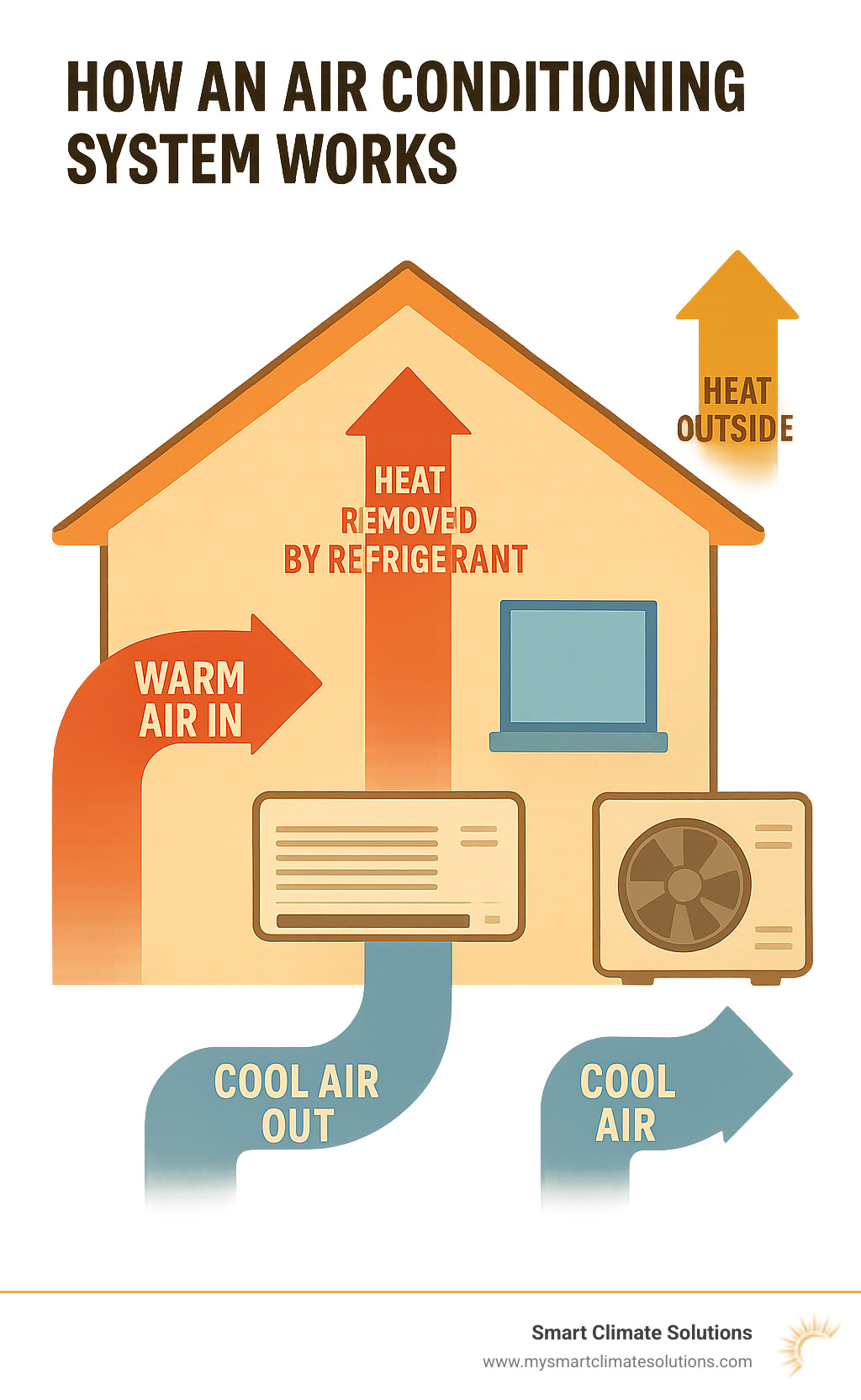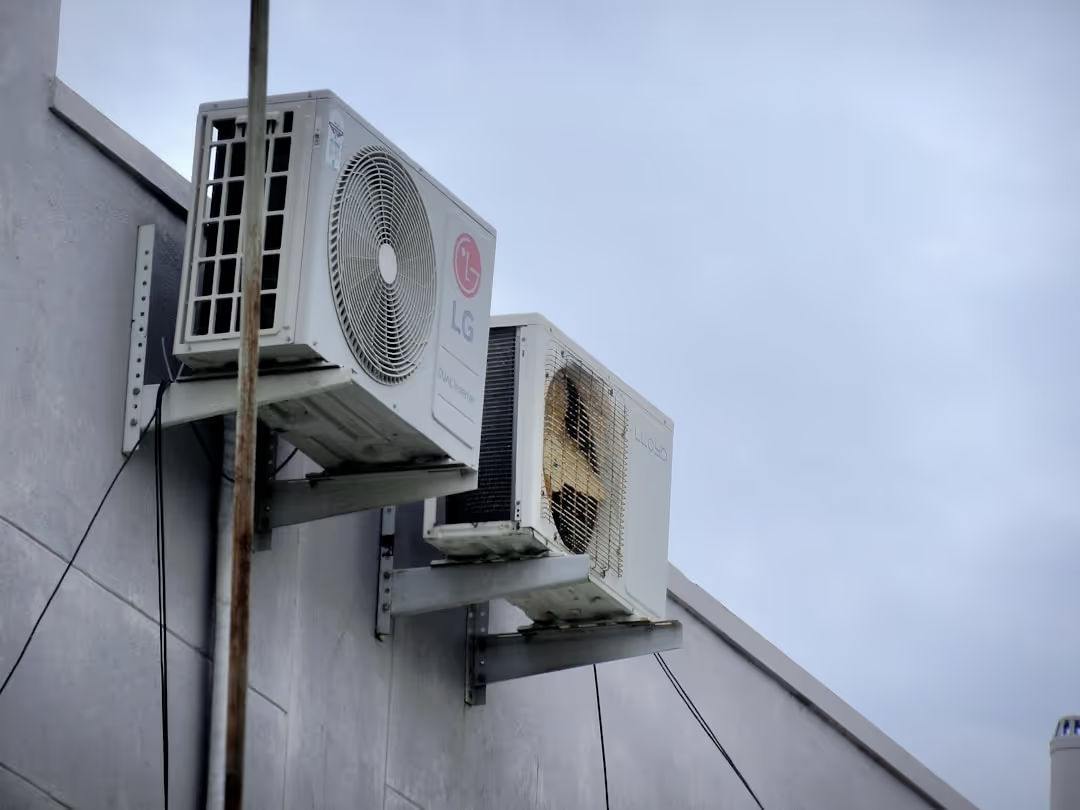The Science of Cool: How an Air Conditioner Works
An air conditioning system does more than just "make cold air." It's a heat-moving device. It transfers unwanted heat and humidity from inside your home to the outside, leaving your living space cool and comfortable.
The basic process involves:
- Removing indoor heat.
- Transferring that heat outside.
- Using a chemical called refrigerant.
- Reducing humidity for a cooler feel.
This creates a comfortable indoor climate, crucial for hot Pittsburgh summers.
I'm Bill Scott, General Manager at Smart Climate Solutions. For over 15 years, I've helped Pittsburgh residents find the best air conditioning system solutions for year-round comfort.

An air conditioning system doesn't generate cold; it moves heat. It works like a heat pump in reverse, extracting warmth from your home and transferring it outdoors.
Instead of using outside air, your system recirculates indoor air. It draws in warm, humid air, cools it, and then distributes it back into your home.
Dehumidification is also a key function. As warm, moist air passes over the cold evaporator coil, water condenses, much like on a cold glass. This water is collected and drained away. Removing moisture makes the air feel cooler and helps prevent mold, creating a more comfortable environment.
To visualize this process, take a look at the U.S. Department of Energy's detailed explanation: U.S. Department of Energy - Energy Saver 101 Infographic.
The Refrigerant Cycle Explained
The core of an air conditioning system is the refrigerant cycle. In this continuous loop, a chemical called refrigerant changes between liquid and gas states to absorb and release heat, keeping your home cool.
The four main stages are:
- Evaporation: Inside your home, liquid refrigerant in the evaporator coil absorbs heat from your indoor air. This turns the refrigerant into a low-pressure gas.
- Compression: The compressor, located in the outdoor unit, pressurizes this gas, making it hot.
- Condensation: In the outdoor condenser coil, the hot gas releases its heat to the outside air and condenses back into a liquid.
- Expansion: The liquid refrigerant passes through an expansion valve, which lowers its pressure and temperature, preparing it to repeat the cycle.
This cycle allows your air conditioning system to continuously move heat out of your home.
Key Components of a Typical Air Conditioning System
Several key components work together to keep your Pittsburgh home comfortable. Here are the primary players:
- Evaporator Coil: Located indoors, it absorbs heat from your home's air.
- Condenser Coil: Located outdoors, it releases that absorbed heat outside.
- Compressor: The "engine" of the system, located outdoors, that pressurizes the refrigerant.
- Expansion Valve (or Metering Device): Regulates refrigerant flow into the evaporator coil.
- Thermostat: The control panel on your wall that sets the desired temperature.
- Indoor Unit (Air Handler/Furnace): Houses the evaporator coil and a fan to circulate cooled air.
- Outdoor Unit (Condensing Unit): Contains the condenser coil and compressor.
These components work together seamlessly to ensure your home stays cool and comfortable, even on the hottest summer days.
Choosing Your Comfort: Types of Air Conditioning Systems
Picking the right air conditioning system for your Pittsburgh home is crucial, as one size does not fit all. With over 15 years of experience, I know the perfect system depends on key factors that affect your comfort and budget.
Your home size and budget are major factors. A small ranch has different needs than a large colonial. Consider both the upfront cost and long-term energy savings.
Your existing ductwork is also important. Homes with ducts are well-suited for central air. For older Pittsburgh homes without ducts, there are great alternatives that avoid major renovations.
Pittsburgh's humid climate demands a system with effective dehumidification. Cooling alone isn't enough; without removing moisture, you'll still feel sticky and uncomfortable, even at 72 degrees.
Central Air Conditioning
Central air conditioning is the standard for whole-home comfort, essential for Pittsburgh's hot, humid summers. This air conditioning system uses a network of ducts to deliver cool air to every room.
It consists of an outdoor unit (compressor and condenser) and an indoor unit (evaporator coil and air handler), which often integrates with your furnace.
Whole-home cooling is its biggest advantage, providing consistent temperatures throughout your house. The system also offers improved air quality by filtering dust and pollen. Central systems are quiet indoors because the noisy components are outside.
The main drawback is the higher initial cost, especially if new ductwork is needed. While installation can be complex, the comfort is often worth the investment.
A well-maintained central air conditioning system can last between 15 to 20 years, making it a solid long-term investment.
Ductless Mini-Split Systems
Ductless mini-split systems are a versatile and popular air conditioning system. They have an outdoor unit connected to one or more indoor units via a small conduit.
Their key benefit is zoned cooling. Each indoor unit operates independently, so you can cool only the rooms you are using, which leads to significant energy savings. Energy efficiency is a major strength, as they avoid the energy loss common in ductwork.
Installation is much easier than central air, making them ideal for older homes, additions, or rooms where ductwork is impractical. The main consideration is aesthetics, as the indoor units are visible on walls or ceilings.
For detailed information, the U.S. Department of Energy offers an excellent guide on Ductless Mini-Split Air Conditioners.
Window and Portable Air Conditioners
For cooling a single room, window and portable air conditioning systems are simple, affordable solutions. These self-contained units are easy to install.
Window air conditioners are the most affordable option for quick cooling. They work well for specific rooms but can be noisy and block your window view.
Portable air conditioners sit on the floor and vent hot air through a hose. They are easy to set up and can be moved between rooms. However, they are typically less efficient than window units and take up floor space.
| Feature | Central Air | Ductless Mini-Split | Window/Portable |
|---|---|---|---|
| Coverage | Whole home | Zoned cooling | Single room |
| Installation | Complex (needs ducts) | Moderate (no ducts) | Easy (DIY friendly) |
| Initial Cost | High | Moderate to High | Low |
| Efficiency | High | Very High | Low to Moderate |
| Indoor Noise | Quiet | Quiet | Noisy |
| Visibility | Hidden | Wall-mounted units | Blocks window/floor space |
| Lifespan | 15-20 years | 10-15 years | 5-10 years |
Sizing, Efficiency, and Making the Right Choice for Your Pittsburgh Home
Choosing the right air conditioning system for your Pittsburgh home is critical. An improperly sized unit, whether too big or too small, will lead to discomfort and wasted money.
Pittsburgh's humid summers and variable seasons create unique cooling challenges. A professional assessment is vital. We understand the local climate and how it affects your needs, ensuring you get a system that provides long-term savings.
Why Proper Sizing of an air conditioning system Matters
Getting the size of your air conditioning system right is one of the most important decisions you'll make. Cooling capacity is measured in BTUs (British Thermal Units), often expressed in "tons" (1 ton equals 12,000 BTUs/hour). Most Pittsburgh homes require a 1- to 5-ton unit.
An oversized system will "short cycle." It cools the air too fast and shuts off before removing humidity, leaving you feeling clammy. This constant starting and stopping also causes premature wear on the compressor.
An undersized unit will run constantly without reaching the desired temperature, leading to high energy bills.
Proper sizing considers more than square footage. We analyze ceiling height, insulation, window types, home occupancy, and heat-generating appliances.
Understanding Efficiency Ratings: SEER and ENERGY STAR
When shopping for an air conditioning system, the most important number is its SEER (Seasonal Energy Efficiency Ratio). Like MPG for a car, a higher SEER means greater efficiency.
A 16 SEER unit uses less electricity than a 13 SEER unit, leading to significant energy savings over its lifetime. While higher efficiency units have a higher upfront cost, the savings are substantial in Pittsburgh's humid summers.
Also, look for the ENERGY STAR certification. This government-backed label identifies products that meet strict efficiency guidelines, saving you money and protecting the environment.
Ready to start saving? Learn more at Start Saving Money with ENERGY STAR.
Air Conditioner vs. Heat Pump: What's the Difference?
For Pittsburgh homeowners, understanding the difference between an AC and a heat pump is key. A traditional air conditioning system only cools.
A heat pump does both - it cools in the summer and heats in the winter. It works just like an AC in summer, but a reversing valve allows it to pull heat from the cold outside air and move it into your home during winter.
For Pittsburgh's four seasons, a heat pump's versatility is a major advantage. Modern cold-climate heat pump technology works efficiently even in temperatures as low as -14 degrees F. They can handle most of our winter heating, requiring backup only during extreme cold snaps.
The Rise of Smart Air Conditioners
Smart air conditioners bring modern convenience and efficiency to your cooling system. With Wi-Fi connectivity, you can control your AC from your smartphone.
Remote control and scheduling features allow you to adjust temperatures from anywhere, ensuring your home is comfortable when you arrive while saving energy when you're away.
Advanced systems use learning algorithms to observe your habits and automatically optimize settings for comfort and efficiency. These features provide improved control and energy savings, maintaining your ideal temperature more precisely and using less power.
The Broader Impact of Your Air Conditioning System
Your air conditioning system is part of a global technology that has reshaped modern life, affecting public health, work, and urban development. Globally, the number of AC units is projected to grow from over 1.6 billion to nearly 5 billion by 2050, reflecting rising living standards but also posing environmental challenges.
A Brief History of Air Conditioning
Ancient cooling methods were surprisingly clever, from wet mats in Egypt to Roman aqueducts cooling walls and Persian windcatchers. The first modern air conditioning system, however, was invented in 1902. It was created to solve a humidity problem at a printing plant, and the invention launched an industry.
The residential boom came after World War II, making home air conditioning affordable. By the 1950s, central air became a standard feature in new homes, which had a dramatic impact on the growth of Sun Belt states like Florida, Texas, and Arizona.
For a fascinating dive into how this technology shaped our world, explore A cool look at the history of AC.
Health, Comfort, and Indoor Air Quality
Your air conditioning system is a powerful tool for health and wellness. A key health benefit is preventing heat-related illness. In the U.S., AC prevents an estimated 190,000 deaths annually. During Pittsburgh heat waves, an air conditioning system is life-saving protection against heat stroke and dehydration, especially for vulnerable populations.
Climate control also provides a productivity boost. Studies show people in air-conditioned spaces are more productive. Your AC also improves air quality by filtering dust, pollen, and other allergens, which is especially helpful for those with asthma or allergies.
The dehumidification process is vital for health, preventing mold and mildew growth in Pittsburgh's humid air. However, poorly maintained systems can pose health risks by harboring bacteria. Regular professional maintenance is essential for both efficiency and your family's health.
Ensuring your system is well-maintained is paramount for these benefits. Learn more about the importance of regular care for your unit: Air Conditioner Maintenance.
Environmental and Energy Consumption Concerns
The comfort of an air conditioning system comes with an environmental cost. This "cooling paradox" means that as we use more AC to adapt to a warming climate, we consume more energy, contributing to the problem.
Global electricity consumption for cooling is significant and growing. The environmental impact comes from both the energy consumption and the refrigerants used, which can be potent greenhouse gases if they leak.
Another issue is the urban heat island effect, where outdoor AC units release hot air, making cities warmer and increasing the demand for more cooling.
Fortunately, the industry is developing solutions. Greener refrigerants with lower environmental impact are becoming standard. At Smart Climate Solutions, we prioritize high-efficiency systems and proper maintenance to help Pittsburgh families make environmentally responsible choices.
For a look at our comprehensive approach to residential HVAC, visit Residential HVAC System Solutions Cape Coral FL.
Frequently Asked Questions about Air Conditioners
As an expert helping Pittsburgh families for over two decades, I often hear the same questions about air conditioners. Here are answers to some common concerns.
What are some common AC problems I can troubleshoot myself?
Before calling for service, a few simple checks can often solve common AC problems.
If your AC won't turn on, first check your thermostat. Ensure it's set to "cool" and the temperature is set below the current room temperature. Next, check your circuit breaker box for a tripped breaker.
If your AC is running but not cooling, a dirty air filter is a likely culprit. A clogged filter restricts airflow and can cause the system to blow warm air or freeze up. Also, check the outdoor unit and clear away any leaves or debris blocking airflow.
Water leaks near the indoor unit often indicate a clogged condensate drain line. While you can attempt to clear minor clogs, this issue may require professional help.
When to call a professional: Contact us immediately if you hear grinding or squealing noises, smell burning odors, or suspect a refrigerant leak. These problems can escalate quickly. Our certified technicians are ready to help with AC Repair Pittsburgh, and we offer 24 Hour AC Repair for emergencies.
Is it cheaper to leave the AC on all day or turn it off?
Many Pittsburgh homeowners ask this to save on energy bills. The most efficient method might surprise you. Instead of turning your air conditioning system off when you leave, it's more efficient to set the thermostat 7-10 degrees higher.
This approach prevents your home from getting excessively hot, so your system doesn't have to work overtime to cool it down when you return. This uses less energy than cooling a very hot house from scratch.
Smart thermostats automate this process by learning your schedule and adjusting the temperature for you, maximizing savings effortlessly.
How often should I have my air conditioner serviced?
Preventive maintenance can save you thousands over the life of your system. We recommend annual service, ideally in the spring, before Pittsburgh's summer heat arrives. This is like an annual check-up to catch small issues before they become big problems.
Annual maintenance improves efficiency, which lowers your energy bills. It also prevents breakdowns during the hottest days of summer and helps your system last longer. A well-cared-for air conditioning system can last 15-20 years.
We offer several service options to keep your system in top shape: Air Conditioner Maintenance, AC Tune Up, and an AC Maintenance Plan.
Conclusion: Keeping Your Pittsburgh Home Comfortable
As we've seen, an air conditioning system is a heat-moving machine, not a cold-creator. From central air to ductless mini-splits, there is a cooling solution for every Pittsburgh home and budget.
Proper sizing is crucial for performance and cost, and regular maintenance is the best way to protect your investment and ensure reliability. A well-maintained air conditioning system saves money and provides comfort when you need it most.
In Pittsburgh's humid summers, a reliable air conditioning system is essential for a healthy, comfortable home. It's not a luxury; it's key to your family's well-being, improving everything from sleep to daily comfort.
At Smart Climate Solutions, we have over two decades of experience with Pittsburgh's unique climate. Our certified technicians know what it takes to keep your home comfortable through the hottest, muggiest days. We offer 24/7 emergency support because we know AC problems can't wait.
We proudly serve Pittsburgh and the surrounding communities, including South Hills PA, Burgettstown PA, Washington PA, Steubenville OH, St. Clairsville OH, and Weirton WV. Whether you need a new installation, an expert repair, or a maintenance plan, we are here to help.
Ready to ensure your home stays cool and comfortable? Contact Smart Climate Solutions today for expert advice and service you can trust.





.avif)
.avif)
.png)
